History Cooperative

A Brief History of Psychology
The history of psychology is a fascinating journey that spans thousands of years, exploring the development of our understanding of the human mind and behavior.
Today, psychology has become a common field of study. Academic professionals and curious amateurs now regularly ponder the inner workings of the mind, searching for answers and explanations.
Table of Contents
What is the Brief History of Psychology?
You could argue that the history of psychology starts with ancient medicine and philosophy, as the great thinkers wondered where our ideas came from, and why we all make different decisions.
The Ebers Papyrus , a medical textbook from 1500 BC Egypt, contained a chapter called “The Book of Hearts,” which describes several mental conditions, including the description of a patient whose “mind is dark (melancholic?), and he tastes his heart.”
READ MORE: Ancient Egypt Timeline: Predynastic Period Until the Persian Conquest
Aristotle’s De Anima , or “On The Soul,” explores the concept of thinking as separate from sensation, and the mind as separate from the soul. From Lao Tsu to the Vedic Texts, religious works from around the world influenced psychology by challenging ideas about human nature and decision-making.
The first leap forward in treating the mind as a focus of scientific study came during the Enlightenment period of the 17th Century. Famous philosophers such as Kant, Leibniz, and Wolff were particularly obsessed with understanding the concept of the mind, with Kant specifically establishing psychology as a subset of anthropology.
The Importance of Experimental Psychology
By the middle of the 19th century, philosophy and medicine were moving further and further apart. Within that gap was found psychology.
However, it was not until Gustav Fechner began to experiment in 1830 with the concept of sensation that academics began to devise experiments to test their theories. This crucial step into experimentation is what cements psychology as a science, rather than simply a genre of philosophy.
European universities, especially those in Germany, were excited to develop further experiments and more medical schools offered lectures in “psychology,” “psychophysics,” and “psychophysiology.”
Who is the Main Founder of Psychology?
The person best considered the founder of psychology was Dr. Wilhelm Wundt. While other doctors and philosophers had already been exploring the topics that would come to be known as psychology, Wundt’s formation of the first experimental psychology laboratory earns him the title “the father of psychology.”
Wundt was a medical doctor who graduated from the famed University of Heidelberg in 1856, before immediately moving into academics. As an associate professor of anthropology and “medical psychology,” he wrote Contributions to the Theory of Sense Perception , Lectures on Human and Animal Psychology , and Principles of Physiological Psychology (considered the first-ever textbook of psychology).
In 1879, Wundt opened the first lab dedicated to psychology experiments. Set up at the University of Leipzig, Wundt would dedicate his free time to creating and performing experiments outside of the classes he was teaching.
Who Were the Early Psychologists?
While Wundt is considered the founder of psychology, it is his students that properly cemented the science as distinct from psychiatry, and important enough to treat on its own. Edward B. Titchener, G. Stanley Hall, and Hugo Münsterberg all took Wundt’s findings and set up schools to continue the experiments in Europe and America.
Edward B. Titchener took Wundt’s studies to produce a formal school of thought sometimes known as “structuralism.” With the goal being to quantify thoughts the same way we can objectively measure compounds or movement, Titchener believed all thoughts and feelings contained four distinct properties: intensity, quality, duration, and extent.
G. Stanley Hall returned to the US and became the first president of the American Psychological Association. Hall was most fascinated with child and evolutionary psychology, and how people learned.
While many of his theories are no longer considered sound, the role he played as the promoter of science in America, and bringing both Freud and Jung to lecture in the country, has helped him hear the title of “the father of American psychology.”
Hugo Münsterberg took psychology into the realm of practical application and often butted heads with Wundt as to how science should be used. The first psychologist to consider the application of psychological principles to business management and law enforcement, Münsterberg was also informally interested in the overlap between psychology and entertainment. His book, The Photoplay: A Psychological Study , is considered to be one of the first books on film theory ever written.
The Etymology of the Term “Psychology”
The term “psychology” comes from combining the Greek words “psyche” (meaning breath, life, or the soul) and “logos” (meaning “reason”). The first time the word was used in English was in 1654, in “New Method of Physik,” a science book.
In it, the authors write “Psychologie is the knowledge of the Soul.” Before the 19th century, little difference was given between “the mind” and “the soul,” and early uses of the term appeared in contexts that might today use other terms like “philosophy,” “medicine,” or “spirituality.”
READ MORE: History’s Most Famous Philosophers: Socrates, Plato, Aristotle, and More!
What is Psychology?
Psychology is the scientific discipline of the mind and its relationship to its environment developed through observing and experimenting with how we behave and react to others.
While most definitions of “psychology” speak specifically to mental perception, this is not always the case. “Psychology” studies not just rational thought, but also emotions, sensation, and communication. By “environment,” psychologists mean both the physical world the person is in, but also the physical health of their body and their relationships with other people.
Breaking it down, the science of psychology involves:
- Studying behavior and finding ways to record it objectively.
- Developing theories about the universal influences of behavior.
- Finding ways in which behavior is controlled by biology, learning, and the environment.
- Developing ways in which to change behaviors.
What is the Difference Between a Psychologist and a Psychiatrist?
There is a lot of overlap between psychiatry and psychology, so it may be difficult to fully appreciate the differences. Psychiatrists are medical doctors and are primarily interested in biological psychology. They are often interested in how our physical health affects our thinking and prescribe medication.
Psychologists (especially psychotherapists) are more interested in how we can change behavior without physically changing our bodies through drugs or medical procedures. They cannot prescribe medication.
All the founding fathers of psychology were doctors first, and it was not until the mid-20th century that one could study or practice psychology without a medical degree. Most of today’s psychiatrists are also trained to some degree in psychology, while many clinical psychologists take courses in biological psychology. For this reason, the sciences remain overlapped to the benefit of everyone.
What are the Seven Main Schools of Psychology?
As humanity entered the 20th Century, psychology began breaking off into many schools. While the psychologists of today have a superficial understanding of all schools, they often develop an interest in one or two in particular. To properly understand the modern history of psychology, one should know the seven main schools and the people who influenced their current forms.
The Seven Schools of Psychology are:
- Biological psychology
- Behaviorist psychology
- Cognitive psychology
- Social psychology
- Psychoanalytic psychology
- Humanistic psychology
- Existential psychology
What is Biological Psychology?
Biological psychology, sometimes referred to as “behavioral neuroscience” or “cognitive science,” studies how thoughts and behaviors interact with biological and physiological processes.
Said to have originated with the works of Broca and Wernicke, early practitioners relied on a detailed examination of people with behavioral issues and the later autopsy of their bodies.
Today’s neuropsychologists use imaging such as Functional Magnetic Resonance Imaging (or MRI) to map how the brain acts while someone is thinking about something specific, or undertaking tasks.
READ MORE: Who Invented MRI? The Pioneers Behind Magnetic Resonance Imaging
Behavioral psychologists rely on animal studies as well as human trials. Today, neuropsychologists are an important part of teams working in the cutting-edge area of neural-linking technology, such as Elon Musk’s “Neuralink,” and as part of researching the effects of stroke and brain cancer.
Who Were Broca and Wernicke?
Pierre Paul Broca was a 19th-century French anatomist and anthropologist who studied the brains of patients who had language processing difficulties when alive.
Specifically, these patients had no trouble understanding words but could not say them. Discovering that they all had trauma in a similar area, he realized that a very specific section of the brain (the lower left of the frontal lobe) controlled our ability to turn mental processes into words we could say out loud. Today this is known as “Broca’s Area.”
Only a few years later, based on the research of Broca, German physician Carl Wernicke was able to discover the area of the brain that translated words into thoughts. This area is now known as “The Wernicke area,” while patients that suffer from the two forms of language processing issues are said to have “Broca’s Aphasia” or “Wernicke’s Aphasia” as appropriate.
What is Race Psychology?
An unfortunate byproduct of biological psychology has been the rise of “Race Psychology,” a pseudoscience closely connected with the Eugenics movement.
Carl von Linnaeus , the famous “father of taxonomy” believed that different races had biological differences that caused them to be smarter, lazier, or more ritualistic. As greater experimentation and more robust use of the scientific method has been used, the works of “race psychologists” have been completely debunked.
What is Behaviorist Psychology?
Behaviorist psychology is built on the tenet that most, if not all, behavior is learned rather than biologically induced. Early researchers in this field believed in “classical conditioning,” and therapy known as “behavioral modification.”
The father of classical conditioning was Ivan Pavlov (the man with the famous dogs), whose 1901 experiments earned him the Nobel Prize in Physiology.
Later behaviorists developed the early ideas into a field known as “operant conditioning.” The works of B.F. Skinner, a pioneer in this area and famous for his work in educational psychology, are still used in the classrooms of today.
Who Were Pavlov’s Dogs?
Pavlov used over 40 dogs in his experiments. Despite this, the psychologist became attached to one specific collie called Druzhok. Druzhok retired from experiments to become his pet.
The famous “Pavlov’s dogs” experiment is a well-known tale with a darker one following it.
Pavlov noticed that, when introduced to food, dogs would salivate more. He even went so far as to operate on live dogs and measure how much saliva their glands would secrete.
Through his experiments, Pavlov was able to note that dogs would salivate more when expecting food (say, by hearing the dinner bell), even if no food was introduced. This indicated evidence that the environment (the bell warning of food) was enough to teach a physical response (salivation).
Sadly, however, the experiments did not end there. Pavlov’s student, Nikolay Krasnogorsky, took the next step – using orphan children . Drilling into their salivary gland to obtain exact measurements, children would have their hand-squeezed as they were given a cookie. Later, they would have their hand-squeezed and, like the dogs before them, salivate even without the food being present. Through this horrifying process, Krasnogorsky was able to prove that the canine physiological response was also present in humans.
While Pavlov’s experiments still have some validity today, they are often considered in conjunction with biological psychology. Pavlov continued to experiment until his death, which he insisted a student record notes for.
No one knows the fate of the orphans.
What is Cognitive Psychology?
Perhaps the most popular school of psychology today, cognitive psychology studies how mental processes work as separate from the underlying causes. Cognitivists are less concerned about whether behavior comes from the environment or biology, and more about how thought processes lead to choices. Those who were concerned, like Albert Bandura, believed that students could learn simply through exposure to processes, rather than through the reinforcement the behaviorists believed was required.
The most important development from this school was Cognitive Behavioral Therapy (or CBT). Now one of the most popular forms of psychotherapy, it was developed by psychologist Albert Ellis and psychiatrist Aaron Beck in the 1960s.
At first, psychologists were wary of using a treatment that did not involve the high levels of introspection others did, and notable luminaries of the profession were unconvinced. However, after repeated experiments with impressive results , more therapists were convinced.
What is Social Psychology?
Social psychology, which has close ties to social anthropology, sociology, and cognitive psychology, is concerned specifically with how a person’s social environment (and relationship with others) affects their behavior. Psychologists who observe and experiment with peer pressure, stereotyping, and leadership strategies are all part of the school.
Social psychology evolved primarily from the work of those psychologists who worked on the use of propaganda during the World Wars and later the Cold War between the USA and the USSR.
However, by the 1970s, the works of people such as Solomon Asch and the infamous Stanford Prison Experiment brought lessons into the civilian sphere.
What Was the Stanford Prison Experiment?
Designed and run by professor Philip Zimbardo, the 1971 experiment held at Stanford University was to replicate the experience of inmates and guards in a two-week simulation.
Volunteers (who were paid) were randomly selected to be either an inmate or guards and told to act accordingly.
Over five days, the guards were said to have become “increasingly brutal” before the experiment was canceled on the sixth . Zimbardo concluded that, based on the feedback of volunteers and observation of students, the personality of the individual does not govern behavior as much as the social circumstances they are placed in.
That is, if you are told to be a guard, you will naturally act out as an authoritarian.
While the story has been adapted many times by the media, and the myth carries itself as a cautionary tale about the cruelty of humanity, the reality was far less convincing. The experiment and its conclusions were never able to be reproduced . It was later noted that guards were encouraged by supervisors early in the experiment to treat inmates poorly, and some participants claimed that they were refused the ability to withdraw from the experiment early.
Psychologists have long rejected the usefulness of the experiment, despite believing that it is worthwhile to continue experimentation and fully explore the conformity theories that Zimbardo was attempting to prove.
What is Psychoanalytic Psychology?
Psychodynamics and psychoanalysis concern themselves with the concept of conscious and unconscious motivation, philosophic concepts such as the Id and Ego, and the power of introspection. The psychoanalytic theory focuses on sexuality, repression, and dream analysis. For a long time, it was synonymous with “psychology.”
If you imagine psychotherapy as laying back on a leather futon and talking about your dreams while an old man smoking a pipe takes notes, you are thinking about the stereotype that grew from early psychoanalysis.
Popularized in the late 19th century by Sigmund Freud, and then expanded upon by Carl Jung and Alfred Adler, psychodynamics later fell out of favor for its lack of scientific rigor.
Despite this, the works of Freud and Jung are some of the most-examined papers in the history of psychology, and modern experts such as Oliver Sacks have argued that we should reconsider some of the ideas as a form of neuro-psychoanalysis (introspection while under objective imaging observation).
What is the Difference Between Freudian Psychology and Jungian Psychology?
The founder of psychoanalysis, Sigmund Freud, was an Austrian doctor and neuroscientist who opened a psychological clinic only four years into his medical career. There he developed his interest in “neurotic disorders” while diving into all available texts on the theory of perception, pedagogy, and philosophy. He was especially intrigued by the works of the German philosopher Friedrich Nietzsche and French neurologist Jean-Martin Charcot.
Studying hypnosis under Charcot, Freud returned to work more concerned than ever with diving into the “hidden depths” of the mind. However, he believed that “free association” (the voluntary offering of whatever came to the mind) was more effective than hypnosis, and the analysis of dreams could offer far more about the internal motivations of his patients.
In Freud’s “psychoanalysis” method of therapy, dreams represented repressed sexual desire, often stemming from early childhood experiences. All mental disorders were a result of not coming to terms with sexual history and it was the ability to understand unconscious versus conscious motivations that would help a patient find peace.
Among Freud’s more famous concepts were “The Oedipus Complex,” and “The Ego and The Id.”
Carl Jung was possibly the most famous student of Freud. Starting their relationship in 1906, they spent many years corresponding with, studying with, and generally challenging, each other. Jung was a fan of Freud’s early works and was determined to expand on them.
Unlike Freud, however, Jung did not believe that all dreams and motivations stemmed from sexual desire. Instead, he believed that learned symbols and imagery within dreams held the answers to motivation. Jung also believed that inside every man was a psychological “image” of their feminine self and vice versa. He was the primary influence of the popular lay notion of “introversion and extroversion,” as well as a supporter of art therapy.
Freudian and Jungian “psychologists” today still hold onto the belief that our dreams offer insight into our motivations and carefully pour over thousands of symbols to make their analysis.
What is Humanistic Psychology?
Humanistic, or Existential Psychology, is a relatively new school, developed in response to psychoanalysis and behaviorism. Focusing on the concept of “self-actualization” (the meeting of all needs) and free will, humanists believe that mental health and happiness can be reached simply by having a core set of needs fulfilled.
The primary founder of this school of human behavior was Abraham Maslow, an American psychologist who proposed the idea that there were certain levels of needs and that to find fulfillment in complex needs we must ensure first that more basic needs have been met.
What is Maslow’s Hierarchy of Needs?
The concept of meeting core requirements before finding actualization was written out in Abraham Maslow’s 1943 work A Theory of Human Motivation , and was known as “the hierarchy of needs.”
Despite a distinct lack of scientific rigor, Maslow’s theories have been taken up by education departments , business organizations, and therapists quite willingly due to their simplicity. While there stands criticism that needs could not be “ranked so easily,” and that certain needs were not addressed, Maslow pre-empted this in his original work by recommending his “pyramid” not be taken too strictly. “We have spoken so far as if this hierarchy were a fixed order, but it is not nearly so rigid as we may have implied.”
What is Existential Psychotherapy?
A subset of humanism, the applied psychology of existentialism draws further influence from the European philosophy of the mid-20th century. The primary founder of such psychotherapy was the renounced doctor and holocaust-survivor Viktor Frankl. His “logotherapy,” developed after being ejected from the psychoanalytic school developed by Alfred Adler, was further refined at Theresienstadt and Auschwitz concentration camps, where he saw the rest of his family murdered.
Frankl believed that happiness was derived from having meaning in your life and that once you found a meaning to pursue, life became easier. This appealed greatly to a 1960s youth feeling “directionless,” and his book, “Man’s Search for Meaning” was a best-seller. Despite this, very few practitioners of logotherapy exist today.
The Hidden Eighth School: Gestalt Psychology
While the seven main schools of psychology are studied and treated by examining behavior, there is an eighth school entirely devoted to the theory of perception. Gestalt psychology was developed early in the history of psychology, responding directly to the works and writings of Wundt and Titchener. Psychological research was scientifically rigorous, and its findings went on to be used in modern clinical psychology as well as neuroscience and cognitive science.
The scientific psychology of the Gestaltists emphasized the ability of a human being to perceive patterns and how the perception of patterns governs thought more than the perception of individual elements. Founded by the Austro-Hungarian psychologist, Max Wertheimer, Gestalt psychology developed parallel to those schools more interested in therapy and relied more heavily on physical and biological sciences.
Gestalt Psychology, while still rarely used to inform therapy, is one of the cornerstones of the computer science behind “Machine Learning.” Some of the core problems faced by those studying machine learning, or “Artificial Intelligence” are the same ones studied by Wertheimer and his followers. These problems include the ability for humans to recognize an object regardless of rotation (invariance), the ability to see shapes in the “spaces left behind” by other shapes (reification) and to see both a duck and rabbit in the same picture (multistability).
Modern psychology has only developed in recent centuries but the history of psychology goes back millennia. By recording observable behavior and confirming theories through experimentation, we have been able to turn philosophical musings about the mind into psychological theories, and then an academic discipline.
The history of psychology is too large to fully explore in anything less than a textbook. From the first dips into experimental psychology to the mental health professionals of today, it is on the foundational works of many doctors that we are left with psychological science.
The Future of Psychology
Many of the psychological theories were developed in the early stages of the journey of psychology, but that doesn’t mean new theories aren’t being developed.
Recent psychological theories such as Self-Determination Theory and Unified Theory of Human Psychology are attempting to solve some of the bigger challenges we face as a society, with more theories being developed every day.
Where psychology will be in 15-20 years is anyone’s guess, but it’s clear that there are millions of people around the world dedicated to solving these challenges.
How to Cite this Article
There are three different ways you can cite this article.
1. To cite this article in an academic-style article or paper , use:
<a href=" https://historycooperative.org/history-of-psychology/ ">A Brief History of Psychology</a>
2 thoughts on “A Brief History of Psychology”
Excellent summary
Very helpful summary. Thank you!
Leave a Comment Cancel reply
- Bipolar Disorder
- Therapy Center
- When To See a Therapist
- Types of Therapy
- Best Online Therapy
- Best Couples Therapy
- Managing Stress
- Sleep and Dreaming
- Understanding Emotions
- Self-Improvement
- Healthy Relationships
- Student Resources
- Personality Types
- Guided Meditations
- Verywell Mind Insights
- 2024 Verywell Mind 25
- Mental Health in the Classroom
- Editorial Process
- Meet Our Review Board
- Crisis Support
The Origins of Psychology
From Philosophical Beginnings to the Modern Day
Kendra Cherry, MS, is a psychosocial rehabilitation specialist, psychology educator, and author of the "Everything Psychology Book."
:max_bytes(150000):strip_icc():format(webp)/IMG_9791-89504ab694d54b66bbd72cb84ffb860e.jpg)
Adah Chung is a fact checker, writer, researcher, and occupational therapist.
:max_bytes(150000):strip_icc():format(webp)/Adah-Chung-1000-df54540455394e3ab797f6fce238d785.jpg)
Verywell / Madelyn Goodnight
- Importance of History
- Structuralism
Functionalism
- Psychoanalysis
- Behaviorism
Cognitive Psychology
- Continued Growth
- Women in the Field
While the psychology of today reflects the discipline's rich and varied history, the origins of psychology differ significantly from contemporary conceptions of the field. In order to gain a full understanding of psychology, you need to spend some time exploring its history and origins.
How did psychology originate? When did it begin? Who were the people responsible for establishing psychology as a separate science?
Why Study Psychology History?
Contemporary psychology is interested in an enormous range of topics, looking at human behavior and mental process from the neural level to the cultural level. Psychologists study human issues that begin before birth and continue until death. By understanding the history of psychology, you can gain a better understanding of how these topics are studied and what we have learned thus far.
From its earliest beginnings, psychology has been faced with a number of questions. The initial question of how to define psychology helped establish it as a science separate from physiology and philosophy.
Additional questions that psychologists have faced throughout history include:
- Is psychology really a science?
- Should psychologists use research to influence public policy, education, and other aspects of human behavior?
- Should psychology focus on observable behaviors, or on internal mental processes?
- What research methods should be used to study psychology?
- Which topics and issues should psychology be concerned with?
Background: Philosophy and Physiology
While psychology did not emerge as a separate discipline until the late 1800s, its earliest history can be traced back to Egypt, Greece, China, Persia, and India. In the 17th century, the French philosopher Rene Descartes introduced the idea of dualism, which asserted that the mind and body were two entities that interact to form the human experience.
Many other issues still debated by psychologists today, such as the relative contributions of nature vs. nurture , are rooted in these early philosophical traditions.
So what makes psychology different from philosophy? While early philosophers relied on methods such as observation and logic, today’s psychologists utilize scientific methodologies to study and draw conclusions about human thought and behavior.
Physiology also contributed to psychology’s eventual emergence as a scientific discipline. Early physiological research on the brain and behavior had a dramatic impact on psychology, ultimately contributing to applying scientific methodologies to the study of human thought and behavior.
Psychology Emerges as a Separate Discipline
During the mid-1800s, a German physiologist named Wilhelm Wundt was using scientific research methods to investigate reaction times. His book, published in 1873, "Principles of Physiological Psychology," outlined many of the major connections between the science of physiology and the study of human thought and behavior.
He later opened the world’s first psychology lab in 1879 at the University of Leipzig. This event is generally considered the official start of psychology as a separate and distinct scientific discipline.
How did Wundt view psychology? He perceived the subject as the study of human consciousness and sought to apply experimental methods to studying internal mental processes. While his use of a process known as introspection is seen as unreliable and unscientific today, his early work in psychology helped set the stage for future experimental methods.
An estimated 17,000 students attended Wundt’s psychology lectures, and hundreds more pursued degrees in psychology and studied in his psychology lab. While his influence dwindled as the field matured, his impact on psychology is unquestionable.
Structuralism: Psychology’s First School of Thought
Edward B. Titchener , one of Wundt’s most famous students, would go on to found psychology’s first major school of thought . According to the structuralists , human consciousness could be broken down into smaller parts. Using a process known as introspection, trained subjects would attempt to break down their responses and reactions to the most basic sensation and perceptions.
While structuralism is notable for its emphasis on scientific research, its methods were unreliable, limiting, and subjective. When Titchener died in 1927, structuralism essentially died with him.
The Functionalism of William James
Psychology flourished in America during the mid- to late-1800s. William James emerged as one of the major American psychologists during this period and publishing his classic textbook, "The Principles of Psychology," established him as the father of American psychology.
His book soon became the standard text in psychology and his ideas eventually served as the basis for a new school of thought known as functionalism.
The focus of functionalism was about how behavior actually works to help people live in their environment. Functionalists utilized methods such as direct observation to study the human mind and behavior.
Both of these early schools of thought emphasized human consciousness, but their conceptions of it were significantly different. While the structuralists sought to break down mental processes into their smallest parts, the functionalists believed that consciousness existed as a more continuous and changing process.
While functionalism quickly faded as a separate school of thought, it would go on to influence later psychologists and theories of human thought and behavior.
The Emergence of Psychoanalysis
Up to this point, early psychology stressed conscious human experience. An Austrian physician named Sigmund Freud changed the face of psychology in a dramatic way, proposing a theory of personality that emphasized the importance of the unconscious mind.
Freud’s clinical work with patients suffering from hysteria and other ailments led him to believe that early childhood experiences and unconscious impulses contributed to the development of adult personality and behavior.
In his book The Psychopathology of Everyday Life, Freud detailed how these unconscious thoughts and impulses are expressed, often through slips of the tongue (known as "Freudian slips" ) and dreams . According to Freud, psychological disorders are the result of these unconscious conflicts becoming extreme or unbalanced.
The psychoanalytic theory proposed by Sigmund Freud had a tremendous impact on 20th-century thought, influencing the mental health field as well as other areas, including art, literature, and popular culture. While many of his ideas are viewed with skepticism today, his influence on psychology is undeniable.
The Rise of Behaviorism
Psychology changed dramatically during the early 20th century as another school of thought known as behaviorism rose to dominance. Behaviorism was a major change from previous theoretical perspectives, rejecting the emphasis on both the conscious and unconscious mind . Instead, behaviorism strove to make psychology a more scientific discipline by focusing purely on observable behavior.
Behaviorism had its earliest start with the work of a Russian physiologist named Ivan Pavlov . Pavlov's research on the digestive systems of dogs led to his discovery of the classical conditioning process, which proposed that behaviors could be learned via conditioned associations.
Pavlov demonstrated that this learning process could be used to make an association between a neutral environmental stimulus and a naturally occurring stimulus.
An American psychologist named John B. Watson soon became one of the strongest advocates of behaviorism. Initially outlining the basic principles of this new school of thought in his 1913 paper Psychology as the Behaviorist Views It , Watson later went on to offer a definition in his classic book "Behaviorism " (1924), writing:
"Behaviorism...holds that the subject matter of human psychology is the behavior of the human being. Behaviorism claims that consciousness is neither a definite nor a usable concept."
John B. Watson
The behaviorist, who has been trained always as an experimentalist, holds further that belief in the existence of consciousness goes back to the ancient days of superstition and magic.
The impact of behaviorism was enormous, and this school of thought continued to dominate for the next 50 years. Psychologist, B.F. Skinner furthered the behaviorist perspective with his concept of operant conditioning , which demonstrated the effect of punishment and reinforcement on behavior.
While behaviorism eventually lost its dominant grip on psychology, the basic principles of behavioral psychology are still widely in use today.
Therapeutic techniques such as behavior analysis , behavioral modification, and token economies are often utilized to help children learn new skills and overcome maladaptive behaviors, while conditioning is used in many situations ranging from parenting to education.
The Focus on Human Potential
While the first half of the 20th century was dominated by psychoanalysis and behaviorism, a new school of thought known as humanistic psychology emerged during the second half of the century. Often referred to as the "third force" in psychology, this theoretical perspective emphasized conscious experiences.
American psychologist Carl Rogers is often considered to be one of the founders of this school of thought. While psychoanalysts looked at unconscious impulses and behaviorists focused on environmental causes, Rogers believed strongly in the power of free will and self-determination.
Carl Rogers
The curious paradox is that when I accept myself just as I am, then I can change.
Psychologist Abraham Maslow also contributed to humanistic psychology with his famous hierarchy of needs theory of human motivation. This theory suggests that people are motivated by increasingly complex needs. Once the most basic needs are fulfilled, people become motivated to pursue higher-level needs.
During the 1950s and 1960s, a movement known as the cognitive revolution began to take hold in psychology. During this time, cognitive psychology began to replace psychoanalysis and behaviorism as the dominant approach to the study of psychology. Psychologists were still interested in looking at observable behaviors, but they were also concerned with what was going on inside the mind.
Since that time, cognitive psychology has remained a dominant area of psychology as researchers continue to study things such as perception, memory, decision-making, problem-solving, intelligence, and language.
The introduction of brain imaging tools such as MRI and PET scans have helped improve the ability of researchers to more closely study the inner workings of the human brain.
Psychology Continues to Grow
As you have seen in this brief overview of psychology’s history, this discipline has seen dramatic growth and change since its official beginnings in Wundt’s lab. The story certainly does not end here.
Psychology has continued to evolve since 1960 and new ideas and perspectives have been introduced. Recent research in psychology looks at many aspects of the human experience, from the biological influences on behavior on the impact of social and cultural factors.
Today, the majority of psychologists do not identify themselves with a single school of thought. Instead, they often focus on a particular specialty area or perspective, often drawing on ideas from a range of theoretical backgrounds. This eclectic approach has contributed new ideas and theories that will continue to shape psychology for years to come.
Women in Psychology History
As you read through any history of psychology, you might be particularly struck by the fact that such texts seem to center almost entirely on the theories and contributions of men. This is not because women had no interest in the field of psychology but is largely due to the fact that women were excluded from pursuing academic training and practice during the early years of the field.
A number of women made important contributions to the early history of psychology, although their work is sometimes overlooked.
A few pioneering women psychologists included:
- Mary Whiton Calkins , who rightfully earned a doctorate from Harvard, although the school refused to grant her degree because she was a woman. She studied with major thinkers of the day like William James, Josiah Royce, and Hugo Munsterberg. Despite the obstacles she faced, she became the American Psychological Association's first woman president.
- Anna Freud , who made important contributions to the field of psychoanalysis. She described many of the defense mechanisms and is known as the founder of child psychoanalysis. She also had an influence on other psychologists, including Erik Erikson.
- Mary Ainsworth , who was a developmental psychologist, made important contributions to our understanding of attachment . She developed a technique for studying child and caregiver attachments known as the "Strange Situation" assessment.
A Word From Verywell
In order to understand how psychology became the science that it is today, it is important to learn more about some of the historical events that have influenced its development.
While some of the theories that emerged during the earliest years of psychology may now be viewed as simplistic, outdated, or incorrect, these influences shaped the direction of the field and helped us form a greater understanding of the human mind and behavior.
Mehta N. Mind-body dualism: A critique from a health perspective . Mens Sana Monogr . 2011;9(1):202-209. doi:10.4103/0973-1229.77436
Blumenthal AL. A Wundt Primer . In: Rieber RW, Robinson DK, eds. Wilhelm Wundt in History. Springer; 2001. doi:10.1007/978-1-4615-0665-2_4
Patanella D. Titchener, Edward Bradford . In: Goldstein S, Naglieri JA, eds. Encyclopedia of Child Behavior and Development . Boston: Springer; 2011. doi:10.1007/978-0-387-79061-9
De Sousa A. Freudian theory and consciousness: A conceptual analysis . Mens Sana Monogr . 2011;9(1):210-217. doi:10.4103/0973-1229.77437
Wolpe J, Plaud JJ. Pavlov's contributions to behavior therapy. The obvious and not so obvious . Am Psychol . 1997;52(9):966-972. doi:10.1037//0003-066x.52.9.966
Staddon JE, Cerutti DT. Operant Conditioning . Annu Rev Psychol . 2003;54:115-144. doi:10.1146/annurev.psych.54.101601.145124
Koole SL, Schlinkert C, Maldei T, Baumann N. Becoming who you are: An integrative review of self-determination theory and personality systems interactions theory . J Pers . 2019;87(1):15-36. doi:10.1111/jopy.12380
Block M. Maslow’s hierarchy of needs . In: Goldstein S, Naglieri JA, eds. Encyclopedia of Child Behavior and Development . Springer; 2011. doi:10.1007/978-0-387-79061-9
Russo NF, Denmark FL. Contributions of women to psychology . Ann Rev Psychol . 1987;38:279-298. doi:10.1146/annurev.ps.38.020187.001431
Fancher RE, Rutherford A. Pioneers of Psychology . W.W. Norton; 2016.
Lawson RB, Graham JE, Baker KM. A History of Psychology . Routledge; 2007.
By Kendra Cherry, MSEd Kendra Cherry, MS, is a psychosocial rehabilitation specialist, psychology educator, and author of the "Everything Psychology Book."

Counselling Collective
History of Psychology
Psychology , is the scientific study of behavior and mental processes . It encompasses a vast range of topics, from understanding the intricacies of cognitive functions to exploring the dynamics of social interactions.
Through empirical research and theoretical frameworks, psychology seeks to decipher the underlying principles that govern human thought and action.
This article embarks on a journey through time, tracing the roots of psychology to ancient civilizations, philosophical inquiries, and the pivotal figures who laid the foundation for the modern understanding of the human psyche. [1]

- 1 Ancient Roots in history of psychology
- 2 Timeline of Psychological Developments
- 3 Development of Modern Psychology
- 4 Key Figures and Their Contributions to the History of Psychology
- 5 Timeline of Famous Psychologists:
- 6 Expansion and Diversification of Psychology
- 7 Contributions of Psychology in Applied Settings
- 8 Recent Trends and Future Directions
- 9 Conclusion
- 10 References:
Ancient Roots in history of psychology
The ancient roots of psychology can be traced back to civilizations such as ancient Egypt , Greece, and China, where philosophers and scholars contemplated questions about the human mind and behavior. Greek philosophers like Socrates, Plato, and Aristotle laid the groundwork for understanding the psyche, while ancient Chinese texts explored topics related to human nature and emotions. These early inquiries set the stage for the development of psychology as a formal discipline in later centuries.
In this section we will discuss about ;
- Early philosophical influences
- Contributions from ancient civilizations
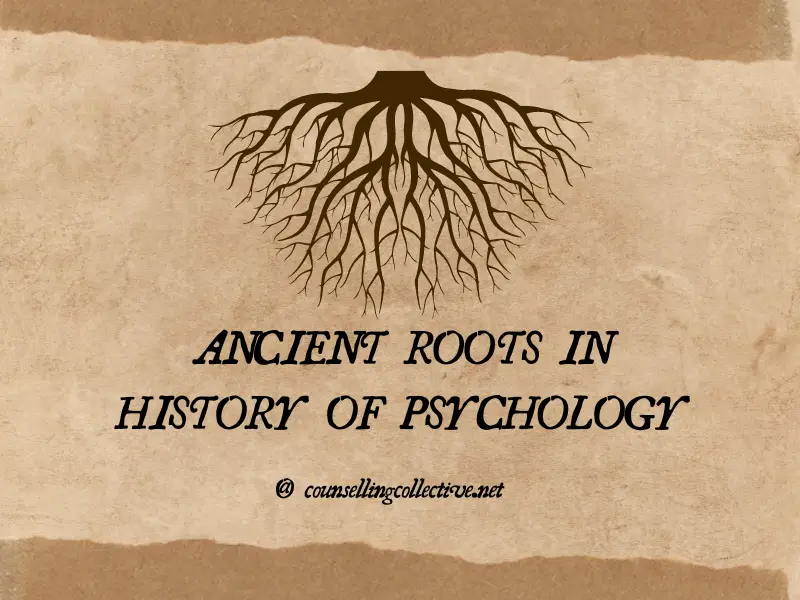

Early Philosophical Influences
The origins of psychological inquiry can be traced back to the philosophical ponderings of ancient thinkers. Greek philosophers, such as Plato and Aristotle , contemplated questions concerning the nature of the mind, the soul, and the essence of human consciousness.
These early musings laid the groundwork for the systematic study of the human psyche.
Contributions from Ancient Civilizations in history of psychology
Ancient egypt and mesopotamia.
- In the history of psychology, the cradle of civilization, the ancient Egyptians and Mesopotamians demonstrated an early fascination with the human mind and behavior.
- Ancient Egyptian texts reveal insights into dream interpretation, emotional experiences, and mental disorders.
- Mesopotamian cuneiform tablets contain references to psychological phenomena, highlighting the enduring human interest in understanding the workings of the mind. [2][3]
Ancient Greece and Rome
- The philosophical traditions of ancient Greece and Rome significantly influenced the trajectory of psychological thought.
- Socrates, Plato, and Aristotle , among others, contemplated the intricacies of human cognition, memory, and emotions.
- Aristotle’s work on associationism and memory, as well as his exploration of the “trichotomy of the soul,” foreshadowed the multifaceted nature of psychological study. [4]
Timeline of Psychological Developments
In the history of psychology, there have been occurrences which have changes the course of the field of psychology. These developments with their respective eras have been listed down in the following table.
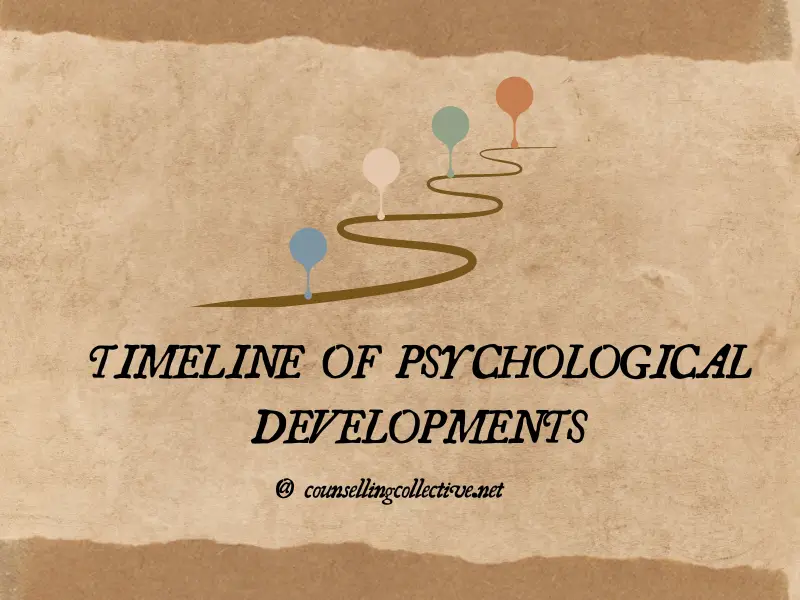
Development of Modern Psychology
The history of psychology is a captivating journey that unveils the evolution of our understanding of the human mind and behavior. Over the years, various schools of thought have emerged, each offering distinctive perspectives and contributing to the mosaic of psychological knowledge. In this section, we will get to know the foundational schools of thought that have shaped the trajectory of modern psychology.
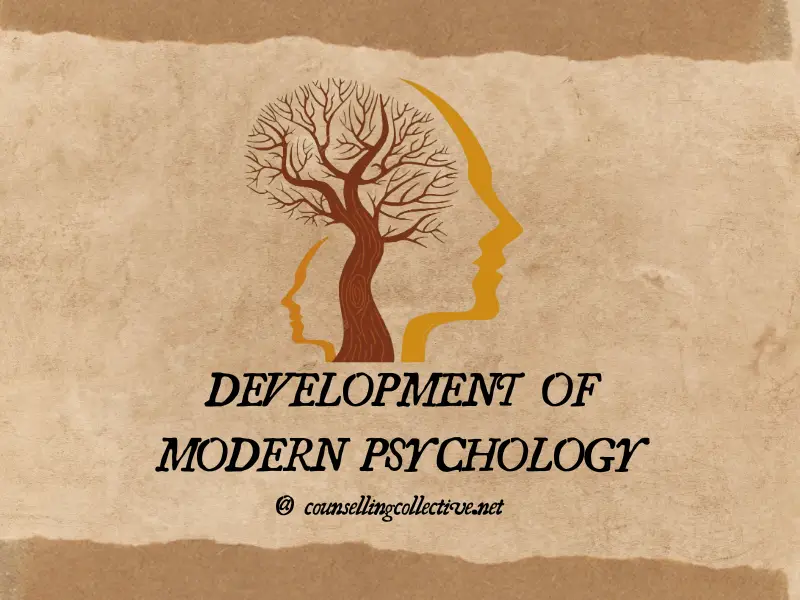
Foundational Schools of Thought
Foundational schools of thought in psychology refer to the early theoretical frameworks that laid the groundwork for the discipline. These include ;
- Structuralism
- Functionalism
- Behaviorism
- Gestalt psychology
Structuralism: Unveiling the Components of Consciousness
At the turn of the 20th century, Wilhelm Wundt ushered in the era of structuralism, an approach dedicated to dissecting the elemental components of conscious experience. Wundt’s Leipzig laboratory became the epicenter of this movement, where introspection—the process of self-observation and reporting—was employed to deconstruct mental processes.
- Structuralists sought to isolate and analyze the basic elements of thoughts, sensations, and emotions, aiming to construct a comprehensive framework for understanding the complexities of human consciousness.
- The works of Edward Titchener , a student of Wundt, further solidified the structuralist perspective . Titchener’s approach focused on identifying the building blocks of consciousness, often referred to as “sensations” and “images.” While structuralism waned in prominence over time, its legacy continues to influence the study of perception, memory, and thought processes.
Functionalism: Embracing the Functions of Behavior
In contrast to structuralism’s emphasis on the parts, functionalism directed its focus towards the purposes and adaptive functions of behavior.
- Proposed by the American psychologist William James, functionalism viewed consciousness as a dynamic mechanism that facilitates adaptation to the surroundings. James’s seminal publication, “The Principles of Psychology,” searched into the ways in which mental processes fulfill pragmatic functions in people’s everyday experiences.
- Functionalism presented a more comprehensive outlook on the mind, recognizing that human behavior isn’t a mere collection of disconnected components. Instead, it entails a fluid interaction between mental processes and the external environment.
- This perspective laid the groundwork for investigating cognitive functions, the process of learning, and the complex interconnectedness between individuals and their surroundings.
Behaviorism: Unraveling Observable Behavior
The rise of behaviorism in the early 20th century brought a paradigm shift in psychological inquiry. Rejecting introspection and the study of mental processes, behaviorists like John B. Watson advocated for the scientific study of observable behavior. Behaviorism posited that behavior is influenced by environmental stimuli , and responses can be shaped through conditioning.
- B.F. Skinner further developed this perspective with operant conditioning, demonstrating how reinforcement and punishment shape behavior.
- Behaviorism’s emphasis on empirical observation revolutionized the study of psychology. While criticized for its narrow focus, behaviorism laid the foundation for understanding learning, motivation, and the principles of behavior modification.
Gestalt Psychology: Perceiving the Whole
Amidst the dominance of structuralism and behaviorism, the gestalt psychology movement emerged, emphasizing the significance of studying perception and experience as holistic wholes.
- Max Wertheimer, Wolfgang Köhler, and Kurt Koffka led this approach, asserting that the mind organizes sensory information into meaningful patterns.
- Gestalt psychologists challenged the reductionist views of other schools, advocating for an understanding of perception that considers the interaction between elements.
- Their insights into visual and cognitive processes enriched both psychology and other disciplines. Gestalt psychology’s influence can be observed in contemporary studies of cognitive psychology, perception, and problem-solving . [5]
Key Figures and Their Contributions to the History of Psychology
The history of psychology is a complex mosaic formed through the ideas and influential contributions of many key figures who have profoundly influenced our comprehension of the human mind and behavior. From the establishment of the first psychological laboratory to the development of groundbreaking theories, these luminaries have left indelible marks on the field.
In this section, we embark on a journey through time to explore the pivotal contributions of;
- Wilhelm Wundt
- William James
- Sigmund Freud
- Ivan Pavlov
- B.F. Skinner
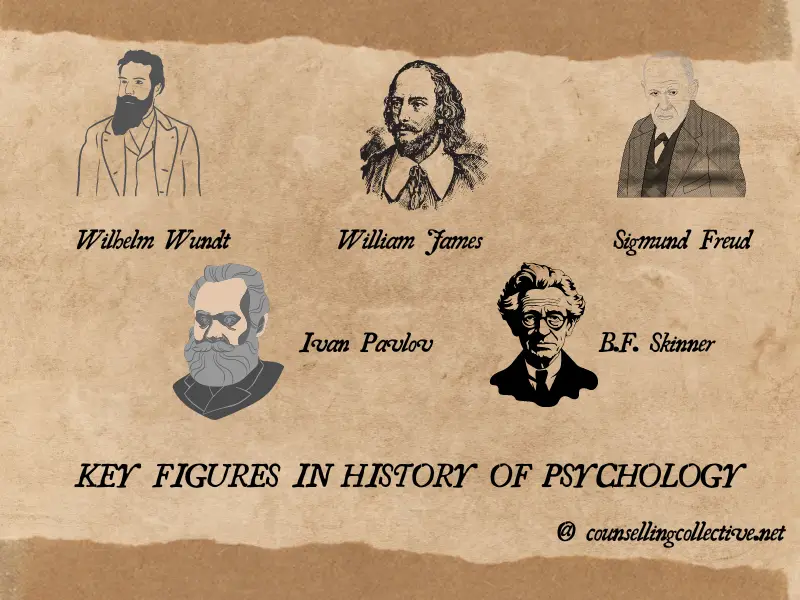
Wilhelm Wundt and the Establishment of the First Psychological Laboratory
Wilhelm Wundt , a German philosopher and psychologist, is often hailed as the pioneer of modern psychology. In 1879 , he founded the first experimental psychology laboratory at the University of Leipzig, Germany. Wundt’s laboratory marked a turning point, emphasizing the importance of empirical research and systematic observation in studying mental processes.
- Wundt’s approach , known as structuralism , aimed to analyze the components of consciousness through introspection. His work laid the groundwork for understanding the elemental aspects of thoughts, sensations, and emotions.
- Wundt’s dedication to scientific inquiry set a precedent for the rigorous methodologies that would become integral to psychology’s development. [5]
William James and the Functionalist Perspective
- William James , an American philosopher and psychologist , offered an alternative perspective to the structuralist approach. His functionalist perspective, as outlined in his seminal work “The Principles of Psychology” (1890) , shifted the focus from structure to the function of consciousness.
- James emphasized that the mind is a dynamic entity, constantly adapting to its environment . He explored topics such as consciousness, memory, and emotions from the standpoint of their practical utility in human life . James’s functionalism broadened the scope of psychology, paving the way for the exploration of cognitive processes and the intricate interplay between individuals and their surroundings. [6]
Sigmund Freud and the Psychoanalytic Approach
Sigmund Freud, an Austrian neurologist and the father of psychoanalysis , introduced a revolutionary approach to understanding the human mind .
- In the late, Freud proposed that unconscious desires, conflicts, and childhood experiences play a pivotal role in shaping human behavior. His psychoanalytic approach searched into the hidden recesses of the mind.
- Freud’s theories , including concepts like the id, ego, and superego, unveiled the complexities of the unconscious mind and laid the foundation for the field of clinical psychology. His exploration of dream analysis, defense mechanisms, and the influence of sexuality on human behavior transformed our understanding of the deeper motivations that drive human actions. [7]
Ivan Pavlov and Classical Conditioning
Russian physiologist Ivan Pavlov’s contributions to psychology centered around his research on classical conditioning . His experiments with dogs in the early 20th century demonstrated how behaviors could be conditioned through associations .
- Pavlov observed that animals could learn to anticipate specific events based on repeated pairings of stimuli.
- Pavlov’s work provided a critical foundation for behaviorism , a dominant school of thought in psychology. His research highlighted the significance of environmental stimuli in shaping behavior, leading to the development of classical conditioning principles that have applications in various domains, including learning, therapy, and even advertising.[8]
B.F. Skinner and Operant Conditioning
B.F. Skinner, an influential behaviorist, expanded our understanding of behavior through his research on operant conditioning. Unlike classical conditioning, which focuses on involuntary responses, operant conditioning centers on the consequences of voluntary actions . Skinner’s work introduced the concepts of reinforcement and punishment.
Skinner’s operant conditioning principles demonstrated how behavior could be modified and shaped through the use of positive or negative consequences. His research laid the foundation for behavior therapy approaches and emphasized the importance of external factors in influencing behavior.[9]
Timeline of Famous Psychologists:
This timeline provides a glimpse into the major milestones and influential figures in the history of psychology since the 18th century, showcasing the diverse and evolving nature of the field.
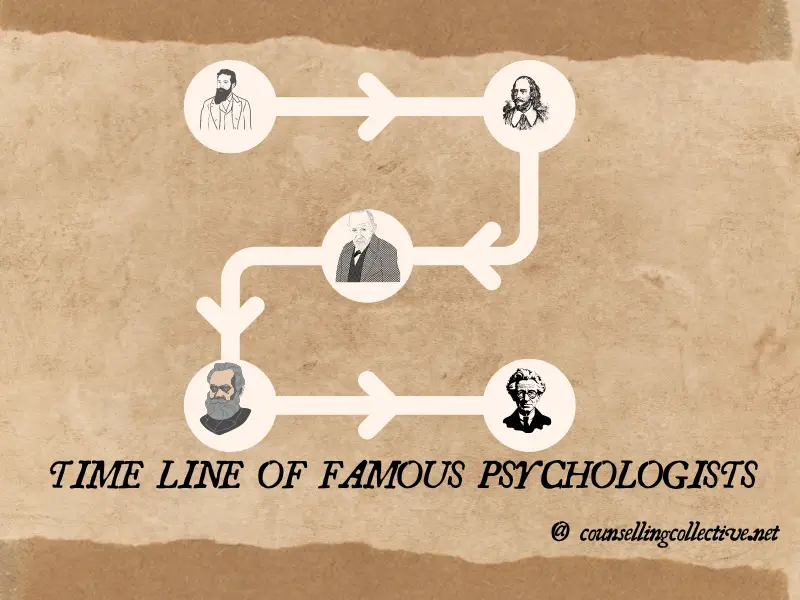
Expansion and Diversification of Psychology
The history of psychology is a fascinating story that unfolds over centuries, encompassing various theories and evolving into a diverse field.
In this article, we take a comprehensive journey through psychology’s growth and diversification, exploring its various branches and their impact on our understanding of the human psyche.
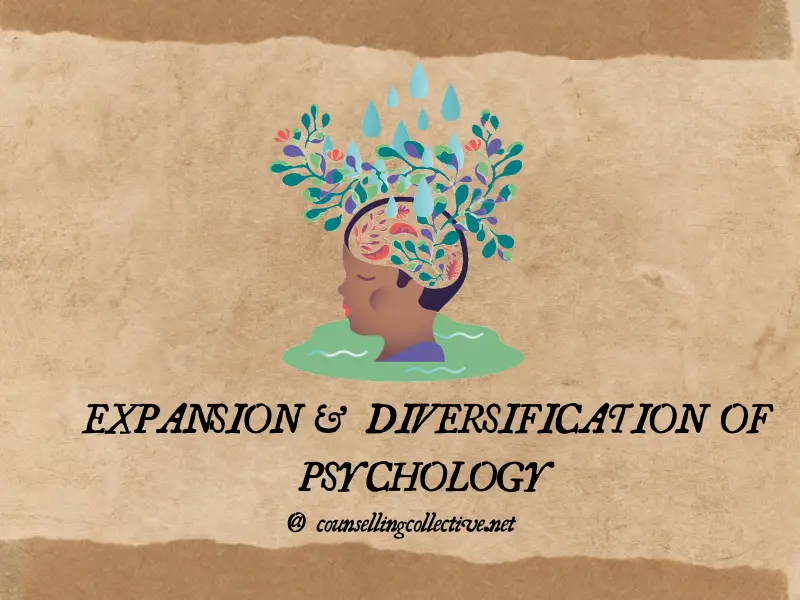
Humanistic Psychology: Embracing the Essence of Humanity
In the mid-20th century , a new movement emerged within psychology, focusing on the inherent dignity and potential of human beings. Humanistic psychology , led by luminaries such as Abraham Maslow and Carl Rogers , sought to counterbalance the prevailing behaviorist and psychoanalytic approaches by accentuating the positive aspects of human experience.
Humanistic psychology views individuals as unique beings with innate capacities for self-actualization and personal growth. It emphasizes subjective these ;
- Experiences.
- Self-awareness.
- Importance of individuals’ conscious perceptions of their own lives.
By prioritizing human values and aspirations, humanistic psychology encourages a holistic understanding of human nature that extends beyond mere scientific analysis. [10]
Cognitive Psychology: Unraveling Mental Processes
The cognitive revolution, which gained momentum in the 1950s , brought about a paradigm shift in psychology. Cognitive psychology shifted the focus from observable behavior to the exploration of mental processes such as perception, memory, reasoning, and problem-solving. Figures like Ulric Neisser and George Miller played key roles in this transition.
Cognitive psychology introduced the idea that the mind processes information similarly to a computer, sparking the development of cognitive models and theories. This approach has had a profound impact on fields ranging from education to artificial intelligence, as researchers seek to understand how the mind processes and organizes information.[11][13]
Developmental Psychology: Tracing Lifespan Changes
Developmental psychology examines the changes that occur in individuals over the course of their lives. Pioneers such as Jean Piaget and Erik Erikson laid the foundation for understanding cognitive, emotional, and social development from infancy to old age. Piaget’s stages of cognitive development and Erikson’s psychosocial stages have become influential frameworks in the field.
Developmental psychology illuminates the factors that shape individuals at different life stages, from the acquisition of language and social skills in childhood to the challenges of aging. By studying these developmental approaches , researchers and practitioners gain insights into how experiences and environments impact human growth and maturation.[12]
Social Psychology: Probing Group Dynamics and Behavior
Social psychology explores how individuals are influenced by their interactions with others and the larger social context.
Figures like Kurt Lewin and Solomon Asch laid the groundwork for understanding group dynamics, conformity, and social influence. This branch investigates topics such as prejudice, attitudes, and interpersonal relationships.
Social psychology sheds light on how individuals navigate the complexities of social interactions, revealing the subtle ways in which external factors impact behavior, beliefs, and perceptions. The insights gained from social psychology have implications for fields including marketing, communication, and conflict resolution.
Biological and Evolutionary Psychology: Exploring the Brain-Mind Connection
Advances in neuroscience have led to the emergence of biological and evolutionary psychology, fields that searched into the intricate relationship between biology and behavior. These branches examine the physiological processes underlying psychological phenomena, as well as how evolutionary forces have shaped human cognition and behavior.
Biological psychology investigates the neural mechanisms responsible for emotions, motivation, and psychological disorders.
Evolutionary psychology, on the other hand, searches into how adaptations that were advantageous for our ancestors continue to influence our behavior today. These fields offer insights into the biological foundations of mental processes and behaviors, bridging the gap between brain and mind.[11]
Contributions of Psychology in Applied Settings
Psychology plays a crucial role in applied settings, where its contributions are diverse and impactful.
Psychology has contributed in every aspect of present day life, be it personal or professional, individual or social. This section will list down the important areas of our lives which have been revolutionized by advances in the field of psychology.
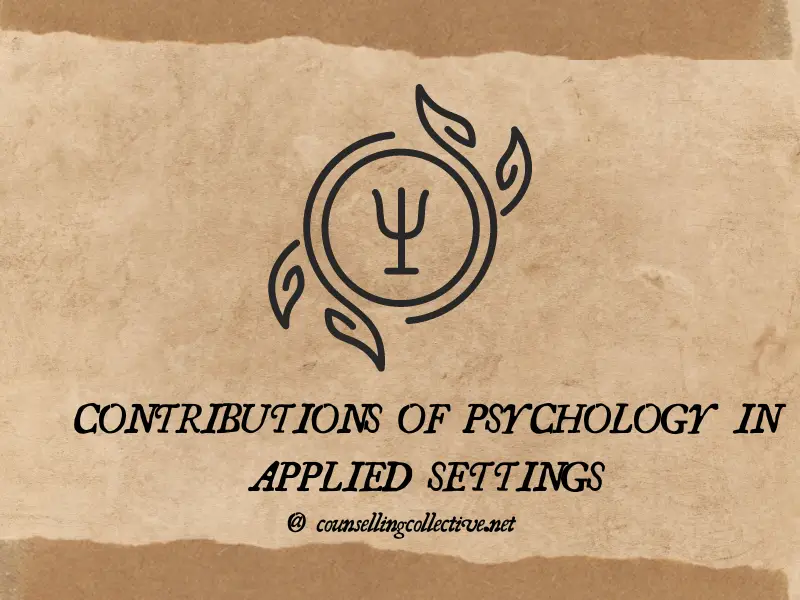
Here are some key areas where psychology has made significant contributions:
- Improving Lives; Psychology goes beyond theory, with real-world applications that touch various aspects of human existence. From bolstering mental health to optimizing workplaces and aiding legal processes, applied psychology has a profound impact. In this concise version, we explore its key branches and contributions.
- Clinical Psychology: Guiding Mental Health Clinical psychology tackles mental health challenges. It combines research and therapy to diagnose, treat, and prevent disorders like depression and anxiety.
- Counseling Psychology: Fostering Growth Counseling psychology supports personal development and emotional well-being. It helps individuals navigate life’s challenges, improve self-awareness, and build resilience.
- Educational Psychology: Enhancing Learning Educational psychology optimizes teaching and learning. It considers factors like cognitive development and motivation, tailoring approaches to diverse learning styles.
- Industrial and Organizational Psychology: Shaping Workplaces I/O psychology focuses on workplace dynamics. It enhances employee satisfaction, productivity, and organizational effectiveness.
- Forensic Psychology: Bridging Law and Psychology Forensic psychology blends psychology with the legal system. It evaluates factors like criminal intent and risk assessment, contributing to fair and informed legal decisions.
These branches of applied psychology work together to improve lives, fostering mental well-being, personal growth, effective learning, positive workplaces, and justice within society.
Contemporary Perspectives in Psychology
Contemporary perspectives in psychology encompass a range of approaches that reflect the evolving nature of the field. These include:
- Positive Psychology: Focuses on positive emotions and well-being, aiming to enhance happiness, resilience, and optimism. It promotes a fulfilling life.
- Cross-cultural Psychology: Examines how culture influences human thoughts, emotions, and behavior. It’s crucial for understanding diversity and developing universal interventions.
- Neuroscience and Neuropsychology: Studies the brain and nervous system, providing insights into the biological basis of behavior and mental disorders. It explores areas like emotion processing and memory.
- Evolutionary Psychology : Investigates how natural selection shapes human behavior. It helps us understand why we have evolved certain traits and behaviors.
- Eclectic Approaches: Blend different psychological schools to address individual needs, particularly in clinical psychology. They aim to help clients achieve their specific goals.
These contemporary perspectives in psychology offer diverse lenses through which we explore and understand the complexities of human behavior and mental processes. [14]
Recent Trends and Future Directions
In this section we will discuss recent trends in psychology including interdisciplinary research, technology integration, and a focus on diversity and equity.
Future directions involve AI and data science, addressing the impact of technology on mental health, and emphasizing cultural diversity and ethics in research and practice.
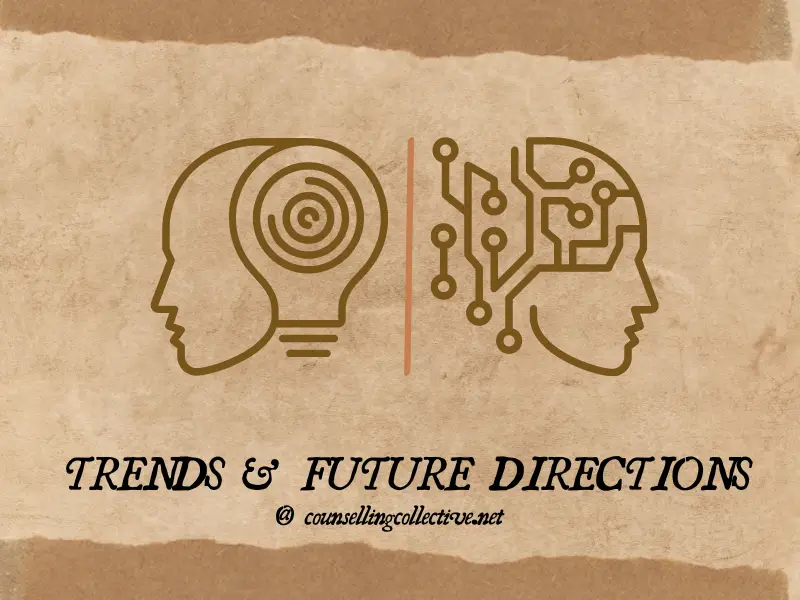
Integration of technology in psychology
Technology is increasingly being used in psychology, for research, assessment, and intervention.
For example, technology is being used to develop virtual reality therapy for anxiety disorders, and to collect data on people’s behavior and mental states. The integration of technology in psychology is still in its early stages, but it has the potential to revolutionize the way that psychology is practiced.
Advancements in neuroscience research
Neuroscience research is advancing at a rapid pace, and this is having a major impact on our understanding of psychology.
For example, recent research has shown that the brain is constantly changing and adapting, which has implications for our understanding of learning, memory, and development. Advances in neuroscience research are also leading to the development of new treatments for psychological disorders.
Emphasis on multicultural perspectives
There is a growing emphasis on multicultural perspectives in psychology. This is due to the increasing diversity of the population, and the recognition that culture plays a significant role in shaping human behavior.
Within the realm of psychology, there are a multitude of emerging fields that have garnered considerable attention in recent times. Notable among these domains are positive psychology, neuroeconomics, and computational psychology.
These cutting-edge disciplines employ innovative techniques and theories to comprehensively investigate various aspects of the human mind, leading to novel and profound understandings of human behavior.
By harnessing these methodologies , researchers are able to shed light on previously unexplored dimensions of the intricate workings of the human psyche.
Interdisciplinary approaches, such as the study of the brain-body connection, are also becoming increasingly common.
In the conclusion, the history of psychology is a journey that spans centuries, reflecting the evolution of human thought, scientific inquiry, and our understanding of the complexities of the human mind and behavior.
From its early philosophical roots to the modern multidisciplinary field it has become, psychology’s growth is marked by a school of thought, and key figures who have left an indelible mark on its directions.
The foundational schools of though t, including structuralism, functionalism, behaviorism , and gestalt psychology, have paved the way for the development of modern psychology. Each perspective offered a unique lens through which to explore the intricate workings of the human mind. Structuralism’s focus on elemental components, functionalism’s emphasis on purpose, behaviorism’s study of observable actions, and gestalt psychology’s holistic perception all contribute to the diverse array of tools available to contemporary psychologists.
The contributions of key figures like Wilhelm Wundt, William James, Sigmund Freud, Ivan Pavlov, and B.F. Skinner has enriched psychology’s tapestry. From establishing the first psychological laboratory to unveiling the depths of the unconscious, their work has laid the foundation for various psychological approaches that continue to shape research, therapeutic interventions, and our understanding of human behavior.
As psychology expanded and diversified , branches like humanistic psychology, cognitive psychology, developmental psychology, social psychology, biological and evolutionary psychology, and more emerged. Each branch offered a specialized perspective that addressed specific facets of the human experience, enriching our understanding of topics ranging from personal growth and cognition to social dynamics and the biological basis of behavior.
Recent trends and future directions demonstrate psychology’s adaptability to societal shifts and technological advancements. The integration of technology , advancements in neuroscience research, emphasis on multicultural perspectives, and the emergence of interdisciplinary fields exemplify psychology’s responsiveness to the ever-evolving landscape of human inquiry. These trends open new avenues for research, intervention, and our collective exploration of the human mind and behavior.
References:
- Importance and advantages of studying history and systems of psychology. Thestoryofpsychology . 2016.
- Mesopotamia: The British Museum. (n.d.). Ancient Mesopotamia: This History, Our History.
- Kamil, S. (2019). Ancient Egyptian Psychiatry . World Journal of Psychiatry, 9(1), 5-12.
- Goodwin, C. J. (2017). A history of modern psychology (5th ed.). John Wiley & Sons. Amazon
- Wundt, W. (1897). Outlines of psychology . Wilhelm Engelmann.
- James, W. (1890). The principles of psychology . Henry Holt and Company.
- Freud, S. (1899). The interpretation of dreams. Basic Books. Amazon
- Pavlov, I. P. (1927). Conditioned reflexes. Dover Publications. Amazon
- Skinner, B. F. (1938). The behavior of organisms. Appleton-Century. Amazon
- Wertheimer, M. (1923). Untersuchungen zur Lehre von der Gestalt, II. Psychologische Forschung, 4(1), 301-350.
- Aronson, E., Wilson, T. D., & Akert, R. M. (2019). Social psychology (10th ed.). Pearson. Amazon
- Erikson, E. H. (1963). Childhood and society (2nd ed.). W. W. Norton & Company. Amazon
- Neisser, U. (1967). Cognitive psychology. Appleton-Century-Crofts. Amazon
- Rogers, C. R. (1951). Client-centered therapy: Its current practice, implications and theory. Houghton Mifflin. Amazon
3 History of Psychology
[latexpage]
Learning Objectives
By the end of this section, you will be able to:
- Understand the importance of Wundt and James in the development of psychology
- Appreciate Freud’s influence on psychology
- Understand the basic tenets of Gestalt psychology
- Appreciate the important role that behaviorism played in psychology’s history
- Understand basic tenets of humanism
- Understand how the cognitive revolution shifted psychology’s focus back to the mind
Psychology is a relatively young science with its experimental roots in the 19th century, compared, for example, to human physiology, which dates much earlier. As mentioned, anyone interested in exploring issues related to the mind generally did so in a philosophical context prior to the 19th century. Two men, working in the 19th century, are generally credited as being the founders of psychology as a science and academic discipline that was distinct from philosophy. Their names were Wilhelm Wundt and William James. This section will provide an overview of the shifts in paradigms that have influenced psychology from Wundt and James through today.
WUNDT AND STRUCTURALISM
Wilhelm Wundt (1832–1920) was a German scientist who was the first person to be referred to as a psychologist. His famous book entitled Principles of Physiological Psychology was published in 1873. Wundt viewed psychology as a scientific study of conscious experience, and he believed that the goal of psychology was to identify components of consciousness and how those components combined to result in our conscious experience. Wundt used introspection (he called it “internal perception”), a process by which someone examines their own conscious experience as objectively as possible, making the human mind like any other aspect of nature that a scientist observed. Wundt’s version of introspection used only very specific experimental conditions in which an external stimulus was designed to produce a scientifically observable (repeatable) experience of the mind (Danziger, 1980). The first stringent requirement was the use of “trained” or practiced observers, who could immediately observe and report a reaction. The second requirement was the use of repeatable stimuli that always produced the same experience in the subject and allowed the subject to expect and thus be fully attentive to the inner reaction. These experimental requirements were put in place to eliminate “interpretation” in the reporting of internal experiences and to counter the argument that there is no way to know that an individual is observing their mind or consciousness accurately, since it cannot be seen by any other person. This attempt to understand the structure or characteristics of the mind was known as structuralism . Wundt established his psychology laboratory at the University at Leipzig in 1879 ( [link] ). In this laboratory, Wundt and his students conducted experiments on, for example, reaction times. A subject, sometimes in a room isolated from the scientist, would receive a stimulus such as a light, image, or sound. The subject’s reaction to the stimulus would be to push a button, and an apparatus would record the time to reaction. Wundt could measure reaction time to one-thousandth of a second (Nicolas & Ferrand, 1999).
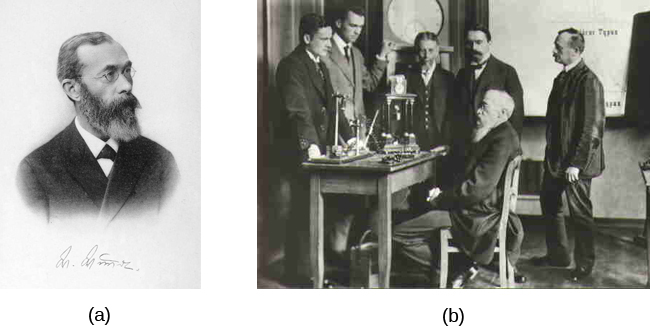
However, despite his efforts to train individuals in the process of introspection, this process remained highly subjective, and there was very little agreement between individuals. As a result, structuralism fell out of favor with the passing of Wundt’s student, Edward Titchener, in 1927 (Gordon, 1995).
JAMES AND FUNCTIONALISM
William James (1842–1910) was the first American psychologist who espoused a different perspective on how psychology should operate ( [link] ). James was introduced to Darwin’s theory of evolution by natural selection and accepted it as an explanation of an organism’s characteristics. Key to that theory is the idea that natural selection leads to organisms that are adapted to their environment, including their behavior. Adaptation means that a trait of an organism has a function for the survival and reproduction of the individual, because it has been naturally selected. As James saw it, psychology’s purpose was to study the function of behavior in the world, and as such, his perspective was known as functionalism . Functionalism focused on how mental activities helped an organism fit into its environment. Functionalism has a second, more subtle meaning in that functionalists were more interested in the operation of the whole mind rather than of its individual parts, which were the focus of structuralism. Like Wundt, James believed that introspection could serve as one means by which someone might study mental activities, but James also relied on more objective measures, including the use of various recording devices, and examinations of concrete products of mental activities and of anatomy and physiology (Gordon, 1995).
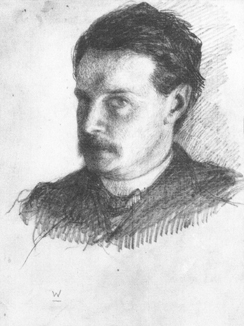
FREUD AND PSYCHOANALYTIC THEORY
Perhaps one of the most influential and well-known figures in psychology’s history was Sigmund Freud ( [link] ). Freud (1856–1939) was an Austrian neurologist who was fascinated by patients suffering from “hysteria” and neurosis. Hysteria was an ancient diagnosis for disorders, primarily of women with a wide variety of symptoms, including physical symptoms and emotional disturbances, none of which had an apparent physical cause. Freud theorized that many of his patients’ problems arose from the unconscious mind. In Freud’s view, the unconscious mind was a repository of feelings and urges of which we have no awareness. Gaining access to the unconscious, then, was crucial to the successful resolution of the patient’s problems. According to Freud, the unconscious mind could be accessed through dream analysis, by examinations of the first words that came to people’s minds, and through seemingly innocent slips of the tongue. Psychoanalytic theory focuses on the role of a person’s unconscious, as well as early childhood experiences, and this particular perspective dominated clinical psychology for several decades (Thorne & Henley, 2005).
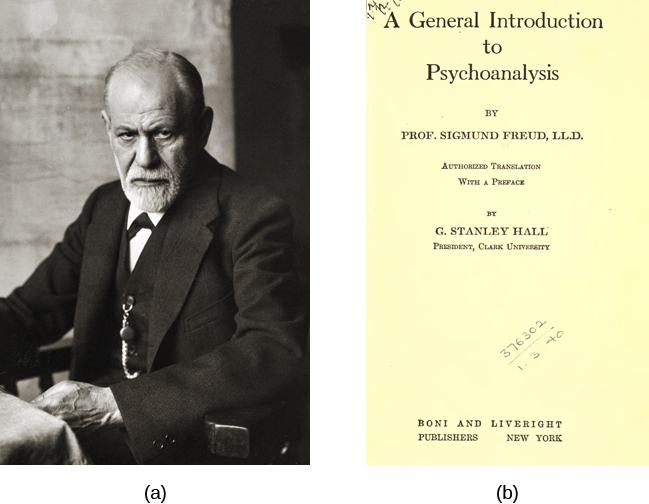
Freud’s ideas were influential, and you will learn more about them when you study lifespan development, personality, and therapy. For instance, many therapists believe strongly in the unconscious and the impact of early childhood experiences on the rest of a person’s life. The method of psychoanalysis, which involves the patient talking about their experiences and selves, while not invented by Freud, was certainly popularized by him and is still used today. Many of Freud’s other ideas, however, are controversial. Drew Westen (1998) argues that many of the criticisms of Freud’s ideas are misplaced, in that they attack his older ideas without taking into account later writings. Westen also argues that critics fail to consider the success of the broad ideas that Freud introduced or developed, such as the importance of childhood experiences in adult motivations, the role of unconscious versus conscious motivations in driving our behavior, the fact that motivations can cause conflicts that affect behavior, the effects of mental representations of ourselves and others in guiding our interactions, and the development of personality over time. Westen identifies subsequent research support for all of these ideas.
More modern iterations of Freud’s clinical approach have been empirically demonstrated to be effective (Knekt et al., 2008; Shedler, 2010). Some current practices in psychotherapy involve examining unconscious aspects of the self and relationships, often through the relationship between the therapist and the client. Freud’s historical significance and contributions to clinical practice merit his inclusion in a discussion of the historical movements within psychology.
WERTHEIMER, KOFFKA, KÖHLER, AND GESTALT PSYCHOLOGY
Max Wertheimer (1880–1943), Kurt Koffka (1886–1941), and Wolfgang Köhler (1887–1967) were three German psychologists who immigrated to the United States in the early 20th century to escape Nazi Germany. These men are credited with introducing psychologists in the United States to various Gestalt principles. The word Gestalt roughly translates to “whole;” a major emphasis of Gestalt psychology deals with the fact that although a sensory experience can be broken down into individual parts, how those parts relate to each other as a whole is often what the individual responds to in perception. For example, a song may be made up of individual notes played by different instruments, but the real nature of the song is perceived in the combinations of these notes as they form the melody, rhythm, and harmony. In many ways, this particular perspective would have directly contradicted Wundt’s ideas of structuralism (Thorne & Henley, 2005).
Unfortunately, in moving to the United States, these men were forced to abandon much of their work and were unable to continue to conduct research on a large scale. These factors along with the rise of behaviorism (described next) in the United States prevented principles of Gestalt psychology from being as influential in the United States as they had been in their native Germany (Thorne & Henley, 2005). Despite these issues, several Gestalt principles are still very influential today. Considering the human individual as a whole rather than as a sum of individually measured parts became an important foundation in humanistic theory late in the century. The ideas of Gestalt have continued to influence research on sensation and perception.
Structuralism, Freud, and the Gestalt psychologists were all concerned in one way or another with describing and understanding inner experience. But other researchers had concerns that inner experience could be a legitimate subject of scientific inquiry and chose instead to exclusively study behavior, the objectively observable outcome of mental processes.
PAVLOV, WATSON, SKINNER, AND BEHAVIORISM
Early work in the field of behavior was conducted by the Russian physiologist Ivan Pavlov (1849–1936). Pavlov studied a form of learning behavior called a conditioned reflex, in which an animal or human produced a reflex (unconscious) response to a stimulus and, over time, was conditioned to produce the response to a different stimulus that the experimenter associated with the original stimulus. The reflex Pavlov worked with was salivation in response to the presence of food. The salivation reflex could be elicited using a second stimulus, such as a specific sound, that was presented in association with the initial food stimulus several times. Once the response to the second stimulus was “learned,” the food stimulus could be omitted. Pavlov’s “classical conditioning” is only one form of learning behavior studied by behaviorists.
John B. Watson (1878–1958) was an influential American psychologist whose most famous work occurred during the early 20th century at Johns Hopkins University ( [link] ). While Wundt and James were concerned with understanding conscious experience, Watson thought that the study of consciousness was flawed. Because he believed that objective analysis of the mind was impossible, Watson preferred to focus directly on observable behavior and try to bring that behavior under control. Watson was a major proponent of shifting the focus of psychology from the mind to behavior, and this approach of observing and controlling behavior came to be known as behaviorism . A major object of study by behaviorists was learned behavior and its interaction with inborn qualities of the organism. Behaviorism commonly used animals in experiments under the assumption that what was learned using animal models could, to some degree, be applied to human behavior. Indeed, Tolman (1938) stated, “I believe that everything important in psychology (except … such matters as involve society and words) can be investigated in essence through the continued experimental and theoretical analysis of the determiners of rat behavior at a choice-point in a maze.”
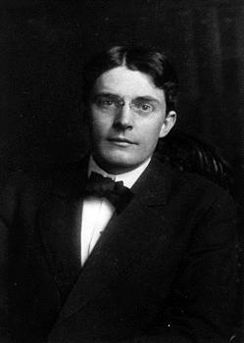
Behaviorism dominated experimental psychology for several decades, and its influence can still be felt today (Thorne & Henley, 2005). Behaviorism is largely responsible for establishing psychology as a scientific discipline through its objective methods and especially experimentation. In addition, it is used in behavioral and cognitive-behavioral therapy. Behavior modification is commonly used in classroom settings. Behaviorism has also led to research on environmental influences on human behavior.
B. F. Skinner (1904–1990) was an American psychologist ( [link] ). Like Watson, Skinner was a behaviorist, and he concentrated on how behavior was affected by its consequences. Therefore, Skinner spoke of reinforcement and punishment as major factors in driving behavior. As a part of his research, Skinner developed a chamber that allowed the careful study of the principles of modifying behavior through reinforcement and punishment. This device, known as an operant conditioning chamber (or more familiarly, a Skinner box), has remained a crucial resource for researchers studying behavior (Thorne & Henley, 2005).
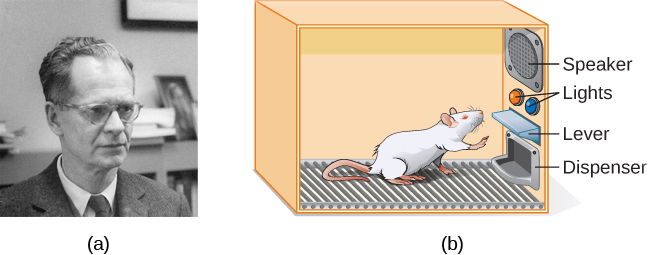
The Skinner box is a chamber that isolates the subject from the external environment and has a behavior indicator such as a lever or a button. When the animal pushes the button or lever, the box is able to deliver a positive reinforcement of the behavior (such as food) or a punishment (such as a noise) or a token conditioner (such as a light) that is correlated with either the positive reinforcement or punishment.
Skinner’s focus on positive and negative reinforcement of learned behaviors had a lasting influence in psychology that has waned somewhat since the growth of research in cognitive psychology. Despite this, conditioned learning is still used in human behavioral modification. Skinner’s two widely read and controversial popular science books about the value of operant conditioning for creating happier lives remain as thought-provoking arguments for his approach (Greengrass, 2004).
MASLOW, ROGERS, AND HUMANISM
During the early 20th century, American psychology was dominated by behaviorism and psychoanalysis. However, some psychologists were uncomfortable with what they viewed as limited perspectives being so influential to the field. They objected to the pessimism and determinism (all actions driven by the unconscious) of Freud. They also disliked the reductionism, or simplifying nature, of behaviorism. Behaviorism is also deterministic at its core, because it sees human behavior as entirely determined by a combination of genetics and environment. Some psychologists began to form their own ideas that emphasized personal control, intentionality, and a true predisposition for “good” as important for our self-concept and our behavior. Thus, humanism emerged. Humanism is a perspective within psychology that emphasizes the potential for good that is innate to all humans. Two of the most well-known proponents of humanistic psychology are Abraham Maslow and Carl Rogers (O’Hara, n.d.).
Abraham Maslow (1908–1970) was an American psychologist who is best known for proposing a hierarchy of human needs in motivating behavior ( [link] ). Although this concept will be discussed in more detail in a later chapter, a brief overview will be provided here. Maslow asserted that so long as basic needs necessary for survival were met (e.g., food, water, shelter), higher-level needs (e.g., social needs) would begin to motivate behavior. According to Maslow, the highest-level needs relate to self-actualization, a process by which we achieve our full potential. Obviously, the focus on the positive aspects of human nature that are characteristic of the humanistic perspective is evident (Thorne & Henley, 2005). Humanistic psychologists rejected, on principle, the research approach based on reductionist experimentation in the tradition of the physical and biological sciences, because it missed the “whole” human being. Beginning with Maslow and Rogers, there was an insistence on a humanistic research program. This program has been largely qualitative (not measurement-based), but there exist a number of quantitative research strains within humanistic psychology, including research on happiness, self-concept, meditation, and the outcomes of humanistic psychotherapy (Friedman, 2008).
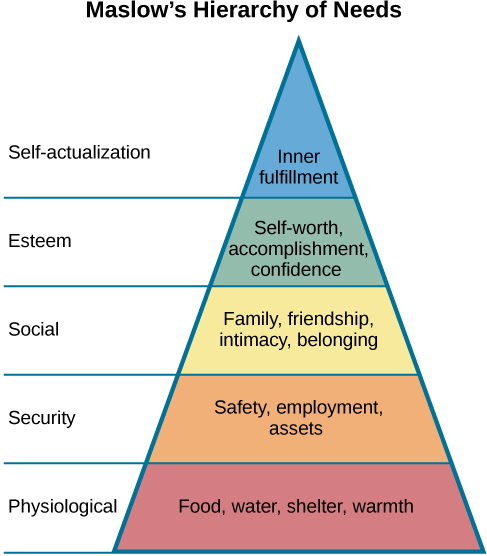
Carl Rogers (1902–1987) was also an American psychologist who, like Maslow, emphasized the potential for good that exists within all people ( [link] ). Rogers used a therapeutic technique known as client-centered therapy in helping his clients deal with problematic issues that resulted in their seeking psychotherapy. Unlike a psychoanalytic approach in which the therapist plays an important role in interpreting what conscious behavior reveals about the unconscious mind, client-centered therapy involves the patient taking a lead role in the therapy session. Rogers believed that a therapist needed to display three features to maximize the effectiveness of this particular approach: unconditional positive regard, genuineness, and empathy. Unconditional positive regard refers to the fact that the therapist accepts their client for who they are, no matter what he or she might say. Provided these factors, Rogers believed that people were more than capable of dealing with and working through their own issues (Thorne & Henley, 2005).
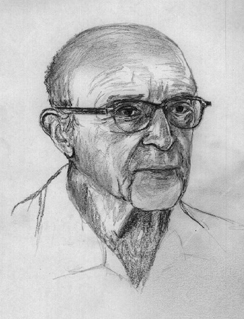
Humanism has been influential to psychology as a whole. Both Maslow and Rogers are well-known names among students of psychology (you will read more about both men later in this text), and their ideas have influenced many scholars. Furthermore, Rogers’ client-centered approach to therapy is still commonly used in psychotherapeutic settings today (O’hara, n.d.)

View a brief video of Carl Rogers describing his therapeutic approach.
THE COGNITIVE REVOLUTION
Behaviorism’s emphasis on objectivity and focus on external behavior had pulled psychologists’ attention away from the mind for a prolonged period of time. The early work of the humanistic psychologists redirected attention to the individual human as a whole, and as a conscious and self-aware being. By the 1950s, new disciplinary perspectives in linguistics, neuroscience, and computer science were emerging, and these areas revived interest in the mind as a focus of scientific inquiry. This particular perspective has come to be known as the cognitive revolution (Miller, 2003). By 1967, Ulric Neisser published the first textbook entitled Cognitive Psychology , which served as a core text in cognitive psychology courses around the country (Thorne & Henley, 2005).
Although no one person is entirely responsible for starting the cognitive revolution, Noam Chomsky was very influential in the early days of this movement ( [link] ). Chomsky (1928–), an American linguist, was dissatisfied with the influence that behaviorism had had on psychology. He believed that psychology’s focus on behavior was short-sighted and that the field had to re-incorporate mental functioning into its purview if it were to offer any meaningful contributions to understanding behavior (Miller, 2003).

European psychology had never really been as influenced by behaviorism as had American psychology; and thus, the cognitive revolution helped reestablish lines of communication between European psychologists and their American counterparts. Furthermore, psychologists began to cooperate with scientists in other fields, like anthropology, linguistics, computer science, and neuroscience, among others. This interdisciplinary approach often was referred to as the cognitive sciences, and the influence and prominence of this particular perspective resonates in modern-day psychology (Miller, 2003).
The science of psychology has had an impact on human wellbeing, both positive and negative. The dominant influence of Western, white, and male academics in the early history of psychology meant that psychology developed with the biases inherent in those individuals, which often had negative consequences for members of society that were not white or male. Women, members of ethnic minorities in both the United States and other countries, and individuals with sexual orientations other than heterosexual had difficulties entering the field of psychology and therefore influencing its development. They also suffered from the attitudes of white, male psychologists, who were not immune to the nonscientific attitudes prevalent in the society in which they developed and worked. Until the 1960s, the science of psychology was largely a “womanless” psychology (Crawford & Marecek, 1989), meaning that few women were able to practice psychology, so they had little influence on what was studied. In addition, the experimental subjects of psychology were mostly men, which resulted from underlying assumptions that gender had no influence on psychology and that women were not of sufficient interest to study.
An article by Naomi Weisstein, first published in 1968 (Weisstein, 1993), stimulated a feminist revolution in psychology by presenting a critique of psychology as a science. She also specifically criticized male psychologists for constructing the psychology of women entirely out of their own cultural biases and without careful experimental tests to verify any of their characterizations of women. Weisstein used, as examples, statements by prominent psychologists in the 1960s, such as this quote by Bruno Bettleheim: “. . . we must start with the realization that, as much as women want to be good scientists or engineers, they want first and foremost to be womanly companions of men and to be mothers.” Weisstein’s critique formed the foundation for the subsequent development of a feminist psychology that attempted to be free of the influence of male cultural biases on our knowledge of the psychology of women and, indeed, of both genders.
Crawford & Marecek (1989) identify several feminist approaches to psychology that can be described as feminist psychology. These include re-evaluating and discovering the contributions of women to the history of psychology, studying psychological gender differences, and questioning the male bias present across the practice of the scientific approach to knowledge.
MULTICULTURAL PSYCHOLOGY
Culture has important impacts on individuals and social psychology, yet the effects of culture on psychology are under-studied. There is a risk that psychological theories and data derived from white, American settings could be assumed to apply to individuals and social groups from other cultures and this is unlikely to be true (Betancourt & López, 1993). One weakness in the field of cross-cultural psychology is that in looking for differences in psychological attributes across cultures, there remains a need to go beyond simple descriptive statistics (Betancourt & López, 1993). In this sense, it has remained a descriptive science, rather than one seeking to determine cause and effect. For example, a study of characteristics of individuals seeking treatment for a binge eating disorder in Hispanic American, African American, and Caucasian American individuals found significant differences between groups (Franko et al., 2012). The study concluded that results from studying any one of the groups could not be extended to the other groups, and yet potential causes of the differences were not measured.
This history of multicultural psychology in the United States is a long one. The role of African American psychologists in researching the cultural differences between African American individual and social psychology is but one example. In 1920, Cecil Sumner was the first African American to receive a PhD in psychology in the United States. Sumner established a psychology degree program at Howard University, leading to the education of a new generation of African American psychologists (Black, Spence, and Omari, 2004). Much of the work of early African American psychologists (and a general focus of much work in first half of the 20th century in psychology in the United States) was dedicated to testing and intelligence testing in particular (Black et al., 2004). That emphasis has continued, particularly because of the importance of testing in determining opportunities for children, but other areas of exploration in African-American psychology research include learning style, sense of community and belonging, and spiritualism (Black et al., 2004).
The American Psychological Association has several ethnically based organizations for professional psychologists that facilitate interactions among members. Since psychologists belonging to specific ethnic groups or cultures have the most interest in studying the psychology of their communities, these organizations provide an opportunity for the growth of research on the impact of culture on individual and social psychology.
Read a news story about the influence of an African American’s psychology research on the historic Brown v. Board of Education civil rights case.
Before the time of Wundt and James, questions about the mind were considered by philosophers. However, both Wundt and James helped create psychology as a distinct scientific discipline. Wundt was a structuralist, which meant he believed that our cognitive experience was best understood by breaking that experience into its component parts. He thought this was best accomplished by introspection.
William James was the first American psychologist, and he was a proponent of functionalism. This particular perspective focused on how mental activities served as adaptive responses to an organism’s environment. Like Wundt, James also relied on introspection; however, his research approach also incorporated more objective measures as well.
Sigmund Freud believed that understanding the unconscious mind was absolutely critical to understand conscious behavior. This was especially true for individuals that he saw who suffered from various hysterias and neuroses. Freud relied on dream analysis, slips of the tongue, and free association as means to access the unconscious. Psychoanalytic theory remained a dominant force in clinical psychology for several decades.
Gestalt psychology was very influential in Europe. Gestalt psychology takes a holistic view of an individual and his experiences. As the Nazis came to power in Germany, Wertheimer, Koffka, and Köhler immigrated to the United States. Although they left their laboratories and their research behind, they did introduce America to Gestalt ideas. Some of the principles of Gestalt psychology are still very influential in the study of sensation and perception.
One of the most influential schools of thought within psychology’s history was behaviorism. Behaviorism focused on making psychology an objective science by studying overt behavior and deemphasizing the importance of unobservable mental processes. John Watson is often considered the father of behaviorism, and B. F. Skinner’s contributions to our understanding of principles of operant conditioning cannot be underestimated.
As behaviorism and psychoanalytic theory took hold of so many aspects of psychology, some began to become dissatisfied with psychology’s picture of human nature. Thus, a humanistic movement within psychology began to take hold. Humanism focuses on the potential of all people for good. Both Maslow and Rogers were influential in shaping humanistic psychology.
During the 1950s, the landscape of psychology began to change. A science of behavior began to shift back to its roots of focus on mental processes. The emergence of neuroscience and computer science aided this transition. Ultimately, the cognitive revolution took hold, and people came to realize that cognition was crucial to a true appreciation and understanding of behavior.
Review Questions
Based on your reading, which theorist would have been most likely to agree with this statement: Perceptual phenomena are best understood as a combination of their components.
- William James
- Max Wertheimer
- Carl Rogers
- Noam Chomsky
________ is most well-known for proposing his hierarchy of needs.
- Abraham Maslow
- Sigmund Freud
Rogers believed that providing genuineness, empathy, and ________ in the therapeutic environment for his clients was critical to their being able to deal with their problems.
- structuralism
- functionalism
- unconditional positive regard
The operant conditioning chamber (aka ________ box) is a device used to study the principles of operant conditioning.
Critical Thinking Questions
How did the object of study in psychology change over the history of the field since the 19th century?
In its early days, psychology could be defined as the scientific study of mind or mental processes. Over time, psychology began to shift more towards the scientific study of behavior. However, as the cognitive revolution took hold, psychology once again began to focus on mental processes as necessary to the understanding of behavior.
In part, what aspect of psychology was the behaviorist approach to psychology a reaction to?
Behaviorists studied objectively observable behavior partly in reaction to the psychologists of the mind who were studying things that were not directly observable.
Personal Application Questions
Freud is probably one of the most well-known historical figures in psychology. Where have you encountered references to Freud or his ideas about the role that the unconscious mind plays in determining conscious behavior?

Share This Book
- Increase Font Size
- Tools and Resources
- Customer Services
- Affective Science
- Biological Foundations of Psychology
- Clinical Psychology: Disorders and Therapies
- Cognitive Psychology/Neuroscience
- Developmental Psychology
- Educational/School Psychology
- Forensic Psychology
- Health Psychology
- History and Systems of Psychology
- Individual Differences
- Methods and Approaches in Psychology
- Neuropsychology
- Organizational and Institutional Psychology
- Personality
- Psychology and Other Disciplines
- Social Psychology
- Sports Psychology
- Share Facebook LinkedIn Twitter
Article contents
History of the history of psychology.
- Adrian C. Brock Adrian C. Brock University of Cape Town, Department of Psychology
- https://doi.org/10.1093/acrefore/9780190236557.013.464
- Published online: 30 April 2020
Reflexivity has been a common theme in the literature on the history of psychology in recent years. Reflecting on the history of psychology is for historians of psychology the ultimate reflexive step. Germany is widely regarded as the homeland of “modern” or “scientific” psychology. It is here that the oldest surviving work with the word “psychology” in the title was published in 1590. It was also here that the first book with the title History of Psychology [Geschichte der Psychologie] was published in 1808. This reflects the fact that a substantial literature on psychology had already been published in Continental Europe by the end of the 18th century. Several other works on the history of psychology were published in German-speaking countries in the 19th century and in the years leading up to the First World War. English-speaking countries were relatively late in adopting psychology, but it grew rapidly in the United States when it was adopted, and the country was already the dominant power in the field by the outbreak of the First World War. Several works on the history of psychology were published in the United States around the same time, suggesting that disciplines and disciplinary history tend to appear simultaneously. This is because disciplines use their history to create a distinct identity for themselves. The history of psychology was widely taught in American psychology departments, and several textbooks were published to support these courses. E. G. Boring’s A History of Experimental Psychology (1929, 1950) was by far the most influential of these textbooks, and it has profoundly shaped the understanding of psychologists of the history of their field. For example, it was Boring who traced the history of the discipline to the establishment of Wilhelm Wundt’s laboratory for experimental psychology at the University of Leipzig in 1879. In 1979–1980, was widely celebrated as the “centennial” of psychology and the XXII International Congress of Psychology was held in Leipzig to mark the occasion. Prior to the 1960s, the history of psychology was mainly a pedagogical field, and it still is as far as many psychologists are concerned. However, it also became an area of specialization during this decade. This was partly due to a few psychologists adopting it as their main area of interest and partly due to historians of science becoming more interested in the field. A large body of scholarly literature has been produced, including some scholarly textbooks, but this literature exists side by side with more traditional textbooks for which there is still a significant demand. There are signs that the history of psychology has been facing difficulties as a branch of psychology in Europe and North America in recent years. However, interest in the field has been growing among psychologists in other parts of the world and among historians of science. This situation will inevitably have implications for the content of the field.
- history of psychology
- reflexivity
- disciplinary history
- scientific controversies
- historiography
- critical history
- history of science
You do not currently have access to this article
Please login to access the full content.
Access to the full content requires a subscription
Printed from Oxford Research Encyclopedias, Psychology. Under the terms of the licence agreement, an individual user may print out a single article for personal use (for details see Privacy Policy and Legal Notice).
date: 18 December 2024
- Cookie Policy
- Privacy Policy
- Legal Notice
- Accessibility
- [66.249.64.20|185.66.15.189]
- 185.66.15.189
Character limit 500 /500

IMAGES
COMMENTS
May 19, 2022 · Learn about the origins and development of psychology as a science, from ancient philosophy to modern experiments. Explore the key figures, schools, and concepts that shaped the field of psychology.
This paper argues that psychology needs to become a historical science to understand cross-temporal variation in human cognition. It reviews examples of research that use historical data and methods to test cultural evolution theory and its implications for psychology.
Many cultures throughout history have speculated on the nature of the mind, heart, soul, spirit, brain, etc. For instance, in Ancient Egypt, the Edwin Smith Papyrus contains an early description of the brain, and some speculations on its functions (described in a medical/surgical context) and the descriptions could be related to Imhotep who was the first Egyptian physician who anatomized and ...
Essay reviews. History of Psychology publishes essay reviews of thematically related sets of books and other media addressing issues important to an understanding of psychology's past. Examples include. an assessment of implications for the understanding of experimental work in psychology of recent studies of other scientists' laboratory practice
Jul 8, 2024 · While psychology did not emerge as a separate discipline until the late 1800s, its earliest history can be traced back to Egypt, Greece, China, Persia, and India. In the 17th century, the French philosopher Rene Descartes introduced the idea of dualism, which asserted that the mind and body were two entities that interact to form the human ...
Development of Modern Psychology. The history of psychology is a captivating journey that unveils the evolution of our understanding of the human mind and behavior. Over the years, various schools of thought have emerged, each offering distinctive perspectives and contributing to the mosaic of psychological knowledge.
Learn about the founders and paradigms of psychology from Wundt and James to Freud and beyond. Explore the methods, concepts, and applications of structuralism, functionalism, psychoanalysis, Gestalt psychology, behaviorism, humanism, and cognitive psychology.
Reflecting on the history of psychology is for historians of psychology the ultimate reflexive step. Germany is widely regarded as the homeland of “modern” or “scientific” psychology. It is here that the oldest surviving work with the word “psychology” in the title was published in 1590.
psychological topics by attempting to clarify what the terms “psychology,”“history,” Cambridge U nive rsit y Pre ss 978-0-521-87076-4 - A Critical History and Philosophy of Psychology: Diversity of Context, Thought, and Practice Richard T. G. Walsh, Thomas Teo and Angelina Baydala Excerpt More information
The study of psychology in philosophical context dates back to the ancient civilizations of Egypt, Greece, China, India, and Persia. Historians point to the writings of ancient Greek philosophers, such as Thales, Plato, and Aristotle (esp. De Anima),[4] as the first significant work to be rich in psychology-related thought. [5]